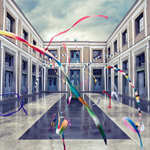|
|
 |
Dusted Reviews
Artist: Efterklang Album: Magic Chairs Label: 4AD Review date: Apr. 9, 2010 |

|
|
|
 |
Trajectories are odd things. Magic Chairs is the third album overall from the Danish group Efterklang, following 2004’s Tripper and 2007’s Parades. Tripper was an ephemeral, elusive album, while Parades took on a weightier approach, sounding something like a jazz orchestra making a sharp turn into scattershot pop. Last year brought Performing Parades, a recording of Parades made in collaboration with the Danish National Chamber Orchestra. At times bombastic, Performing Parades made for an interesting companion piece to the group’s discography. That experience seems to have had an effect on Magic Chairs, the group’s first album for 4AD — it’s the group’s most tangible album, an approach with both benefits and pitfalls.
Casper Clausen’s vocals here have a clarity that they did not possess on earlier recordings. “Modern Drift” sets those vocals against pulsing passages that suggest a fondness for the compositions of Steve Reich. It’s a much more accessible sound than anything previously heard from the band, but it’s also less distinctive; while not abundant, golden-throated indie rock bands with a fondness for minimalism are also not exactly rare in this day and age. Elsewhere on the album, “Scandinavian Love” also puts Clausen’s vocals front-and-center, dancing around a hesitant drumbeat and arrangements that sound less suited to the concert hall than a more theatrical setting.
Admittedly, there’s nothing inherently wrong with a turn toward accessibility, and it’s likely that the reaction of someone encountering Efterklang’s music for the first time with Magic Chairs will be significantly different than that of someone more familiar with their back catalog. But from a perspective of looking into Efterklang’s work to date, their most interesting songs treat vocals as an element to be manipulated as much as anything else. They haven’t abandoned that approach here: Magic Chairs‘ standout moments include “I Was Playing Drums,” in which Clausen’s voice (whether alone or joined with a chorus) has a clipped, rhythmic feel to it, and the way in which the vocals on “Mirror Mirror” seem to seep around the rest of the song.
For now, the experience of listening to Magic Chairs is a frustrating one: the sound of a group with one foot remaining in art-pop territory and the other pointed toward an arena-sized sound. Efterklang might pull off either mode, but their occupation of the same space is a source of unwanted friction, and one hopes that the followup to Magic Chairs applies more of the mystery of their earlier recordings to the grandeur of their more pop-oriented songs.
By Tobias Carroll
|







